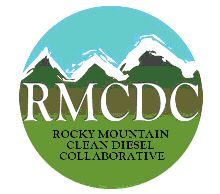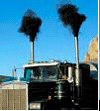Rocky Mountain Clean Diesel Collaborative
|
ATTENTION! Clean Diesel Funding Available in Region 8! Proposals due June 16.
Please see Diesel Emissions Reduction Act (DERA) Funding below for details. On this page: |

|
FLYER: Thank you to everyone who participated in the 2008 Mow Down Pollution Event!!
 Reducing emissions from diesel engines is one of the most important air quality challenges facing the country. Even with more stringent heavy-duty highway engine standards set to take effect over the next decade, over the next twenty years millions of diesel engines already in use will continue to emit large amounts of nitrogen oxides and particulate matter, both of which contribute to serious public health problems. These problems are manifested by thousands of instances of premature mortality, hundreds of thousands of asthma attacks, millions of lost work days, and numerous other health impacts.
Reducing emissions from diesel engines is one of the most important air quality challenges facing the country. Even with more stringent heavy-duty highway engine standards set to take effect over the next decade, over the next twenty years millions of diesel engines already in use will continue to emit large amounts of nitrogen oxides and particulate matter, both of which contribute to serious public health problems. These problems are manifested by thousands of instances of premature mortality, hundreds of thousands of asthma attacks, millions of lost work days, and numerous other health impacts.
The Rocky Mountain Clean Diesel Collaborative, the local arm of the National Clean Diesel Campaign is a partnership of federal, state and local governments, non-profit organizations, the private sector, and environmental groups in Colorado, Montana, North Dakota, South Dakota, Utah and Wyoming. The Collaborative was established in November 2006 and is part of a national campaign to reduce diesel emissions.
Mission:
 Reduce diesel emissions through voluntary efforts to improve air quality and protect human health by promoting grants, leveraging additional funding and offering technical assistance and education to interested parties in Region 8.
Reduce diesel emissions through voluntary efforts to improve air quality and protect human health by promoting grants, leveraging additional funding and offering technical assistance and education to interested parties in Region 8.
Current Partners:
A Collaborative partner is any public or private organization striving to reduce diesel emissions through innovative strategies in diesel technology, renewable fuels and energy efficiency.
- Federal Partners: U.S. EPA Region 8, Federal Highway Administration (FHWA) Colorado Division
- Colorado Partners: Denver Regional Air Quality Council (RAQC), Colorado Department of Public Health and the Environment (CDPHE), Denver Department of Environmental Health, Colorado Department of Transportation (CDOT), Clean Cities Denver.
- Utah Partners: Clean Cities Utah.
 Members:
Members:A member is any public or private organization or person who wishes to be involved with and/or informed about RMCDC projects. Members will receive periodic updates from RMCDC and information related to clean diesel practices.
- Upgrade/retrofit existing diesel engines with improved emission control technologies
- Replace oldest engines/vehicles with newer, less polluting engines/vehicles
- Convert fleets to cleaner burning fuels and/or biofuels
- Encourage policies and practices to reduce unnecessary idling
- Assist with clean diesel projects by promoting grants and leveraging additional funding
Reducing diesel emissions has significant public health benefits. Diesel exhaust contributes to unhealthy levels of fine particles, ozone ("brown cloud") and air toxics. Fine particles have been associated with increased adverse respiratory symptoms, such as asthma, an increased risk of premature death, and numerous other health impacts. Encouraging cleaner diesel practices reduces fuel consumption and excess engine wear, both of which save money.
-
To become an RMCDC partner or member, please contact:
Rebecca Russo, U.S. EPA Region 8 at 303-312-6757 or russo.rebecca@epa.gov
 RMCDC News:
RMCDC News:The Environmental Protection Agency (EPA) announces the update of the Diesel Emissions Quantifier, DEQ 2.0. Updates included in this version allow the user to:
- save a limited number of inputs/results online,
- download results into an excel or csv file, and
- incorporate multiple technologies or strategies on a single fleet. EPA believes these advancements will provide users with an easier method to record, make changes, and view results of their diesel emissions reduction calculations.
Diesel Emissions Reduction Act (DERA) Funding Information
Funding is now available for clean diesel activities. For fiscal year 2008, Congress appropriated funds for the first time under the Energy Policy Act (2005) to help reduce emissions from heavy-duty diesel engines. Through the National Clean Diesel Campaign, the Environmental Protection Agency (EPA) will award grants to assist its eligible partners in building diesel emission reduction programs across the country that improve air quality and protect public health. For fiscal year 2008, the national amount of funding available was $49.2 million. A similar level of funding is expected in FY09.
-
Please see this fact sheet for
more information: PDF (2 pp, 61K)
View the presentation for the March 3rd and March 10th conference calls: PDF (34 pp, 379K)
-
1. National Component
a. National Clean Diesel Funding Assistance Program - CLOSED for FY08
Fact Sheet PDF (2 pp, 61K)
RFP PDF (33 pp, 130K)
b. Clean Diesel Emerging Technologies Program - CLOSED for FY08
Fact Sheet PDF
(2 pp, 65K)
RFP: http://www.epa.gov/air/grants/08-06.pdf
Applications Due: September 21, 2008
View the list of parties interested
in partnering for this grant program: PDF (2 pp, 11K)
c. National Clean Diesel Finance Program - CLOSED for FY08
View the RFP PDF (24
pp, 141K)
2. State Component - CLOSED for FY08
Fact Sheet (2 pp, 67K)
RFP
Workplan Template
PDF (9 pp, 65K)
Read more information
here
You may also visit these pages for more information on other Regional Collaboratives:
National Clean Diesel Campaign Initiative Fact Sheets
 |
Clean School Bus USA Fact Sheet PDF (1 pg, 40K) |
 |
SmartWay Transport Partnership Fact Sheet PDF (1 pg, 42K) |
 |
Clean Agriculture USA Fact Sheet PDF (1 pg, 39K) |
 |
Clean Construction USA Fact Sheet PDF (1 pg, 39K) |
![[logo] US EPA](https://webarchive.library.unt.edu/eot2008/20081026071027im_/http://www.epa.gov/epafiles/images/logo_epaseal.gif)
